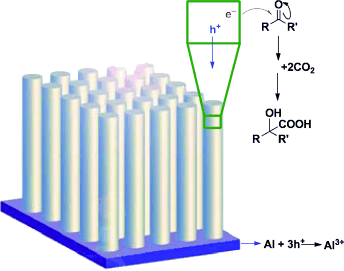A research team headed by Kian L. Tan and Dunwei Wang from Boston College in Chestnut Hill, the United States, has developed a new process based on the mechanisms of the dark reactions of photosynthesis.
 © Wiley-VCH
© Wiley-VCH
The novel process uses silicon nanowires to capture light energy. The researchers were able to produce two precursors of naproxen and ibuprofen, which are anti-inflammatory, pain reducing drugs. They have described their process in the Angewandte Chemie journal. The core process of the dark reactions involves the binding of carbon dioxide with a sugar phosphate such as ribulose-1,5-bisphosphate, resulting in the synthesis of a b–keto acid. This b–keto acid is then modified to a core building block for the synthesis of sugar.
The research team captured sunlight using a photocathode, which are p-doped silicon nanowires. These nanowires can be produced easily, efficiently transform solar energy to electrical energy, and have high stability under the required reaction conditions. Electrons in the atoms of the nanowires get released by the captured photons. It is simple to convert these electrons into organic molecules to active chemical reactions.
The researchers used aromatic ketones as the starting material. Electron transfer from the photocathode triggers these molecules to attack and attach carbon dioxide. After numerous steps, the reaction forms an a-hydroxy acid. This process thus enabled the researchers to synthesis precursors of naproxen and ibuprofen in high yield and with high selectivity.
This process sequence looks like natural photosynthesis but is totally different from earlier methods of binding carbon dioxide using sunlight, and helps solves the issue of very poor selectivity, which has restricted earlier techniques to efficiently produce fuels and typically observed in all conventional efforts on direct carbon dioxide photoreduction. This innovative approach provides the selectivity that is essential for producing complex organic intermediates to synthesize high-value fine chemicals and pharmaceuticals.
Source: http://www.angewandte.org